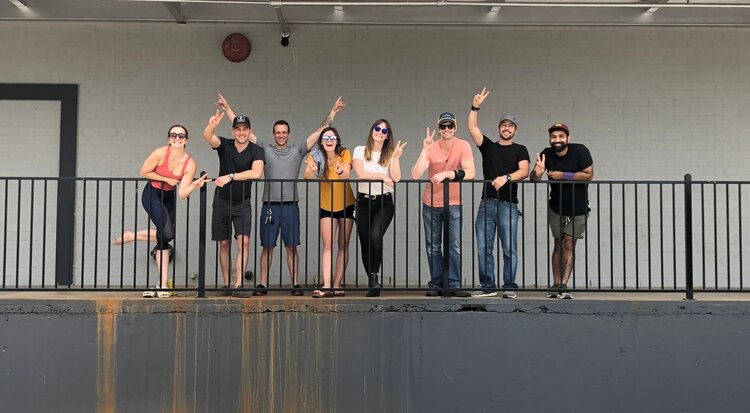Download: Scenario Planning Worksheet
Grace Nicholas, COO and co-owner of Crux Climbing Center in Austin, Texas chats with Chris Sica of Ronin about risk management for small and medium sized businesses, cash forecasting models during revenue loss, and maintaining an entrepreneurial mindset at the leadership and management level when the future is uncertain.

Topics covered in this Interview
- Importance of Short and Long Term Vision for Growing a Business
- Site Selection Logic for New Locations
- Small Business COO Job Description and Metrics
- Framework for Empowering Managers to Own Operations
- Manager Targets, Budgets, and Reporting Cadence
- Risk Management for Small Businesses
- Cash Forecasting with Scenario Planning for Small Business
- Proactive Communications with Stakeholders
Chris: Grace, we’re going to go over how to operate a business successfully when the future is uncertain. We are going to cover things like risk management for small businesses, forecasting revenue losses and how to protect cash flows while taking care of your people in such an uncertain time. These are all topics we’ve worked with Crux on as a small business consultant in Austin, so this should be a fun convo. To start, can you tell us what Crux is?
Grace: Crux Climbing Center is a climbing gym. We also have fitness classes, yoga classes, climbing classes, a retail center, an open gym setting, and even kids programs. Ultimately, we hope that people see us as a community center where they can hang out, make friends, and stay healthy.
Chris: Can you talk about the situation around COVID 19 and how social distancing is affecting small businesses in Austin? How do you think about this from a business owner’s perspective?
Grace: So the scariest thing about COVID 19 is that there are so many unknowns and uncertainty, and everything is developing and changing rapidly. At first, we thought it was going to be a few weeks, then we heard it could be a month, and now some people are saying it could last up to a year. We are seeing restrictions placed on small businesses that are out of their control and that’s the scariest part. We can make our own decisions but when businesses are forced to close down, it starts to get really scary.
Chris: So how do you put some sort of parameters around something so uncertain?
Grace: In business, we like to use the concept of comparable data as much as possible. For COVID 19, we are looking at other countries to see how long it is taking them to work through this. We are already seeing China start to let people move about again. Obviously each country is different in how they are handling it so you have to combine those variables into your thinking (testing, self isolating, treatments). We are forecasting for multiple scenarios including it being resolved in a month, two months, and three months right now and how that affects the financials and our people.
Chris: This brings up the concept of risk management for small businesses. You’re the COO, so I imagine you are expected to come up with some sort of framework for managing risk and how to respond depending on these different scenarios. How do you think about risk management for small businesses and Crux?
Grace: Ultimately, finances are what define how much flexibility we have for dealing with such a huge economic shock. So we start with a deep dive into our financials. We look at our historical financials for the last six months and get extremely granular on direct costs (COGS) and operating expenses (OpEx), or overhead. Within costs and expenses, we categorize them into recurring and non-recurring. Then we further break them down into fixed and variable costs. For this scenario we know that revenue is going to come down. We have forecast for a 100% drop in revenues for now because we are closing to help #flattenthecurve. This means that some of our variable expenses will come down to their lowest possible amount but since our fixed costs are fixed they won’t change. With costs and expenses categorized into recurring and non recurring, variable and fixed, we are able to then sort all these costs from largest to smallest. This allows us to do some real scenario planning and start making decisions based on how things start to play out and we learn more.

Chris: Crux has grown quite a bit over the last years. Can you tell us a little bit about current growth efforts?
Grace: We first worked on an expansion of our original location which just opened up in February, which expanded our fitness center, added more climbing training, as well as saunas and cryotherapy. We also just signed a lease on a second location in North Central Austin, and in the last month, we closed on some land in Round Rock for a third location.
Chris: Do you guys have a short term vision of Crux, and if so what does that look like, how defined is it?
Grace: Well, a lot has changed in the last few weeks about what the short term vision looks like. In the short term, we’d like to get all three locations open, established, and build communities around them. I think we can do this in the next year and a half. Then we want to see how those operate for a bit, collect some performance metrics, and just observe before we expand to more locations if we choose to go that route.
Chris: Is there a strategy you can share with us about why you chose those locations and why you chose three?
Grace: The second location was ideal because it is similar to our first location. Our South Congress location is right next to Cosmic Coffee and Beer, and we’re surrounded by food trucks. We’ve seen this create a wonderful community and the businesses work really well together. Our second location is next to the Brewtorium and we are also bringing Spokesman coffee in (this will be their second location!), so that let’s us build on the community aspect. The Round Rock location has high ceilings which will allow us to expand our top rope climbing offering. Ultimately, we’d like to make sure that everyone in Austin and Round Rock are only ever about 20 minutes away from this community.
Chris: What is the long term vision for Crux?
Grace: We’d love to be able to expand outside of Austin and Round Rock. We are looking for the right kind of places and opportunities and the right partners to do it with. We just want to make sure that we are only going to communities that aren’t currently being served with a climbing gym that provides this sort of community unless there is room for another. We aren’t looking to force anybody out that’s already operating.
Chris: How does having a clearly defined short and long term vision affect operations, day to day decision making, and how you work with customers, managers, and leadership?
Grace: Having that short term and long term plan makes it a lot easier to sort what to be paying attention to and when. There are some numbers in the business that we are able to look at month to month, and some are better to look at quarterly and annually. We are also always able to ask if the efforts we are putting in are getting us closer to the goals or not. Finally, we can check our progress and if we need to pivot, we can do it with intention, knowing what the consequences and benefits are.
Chris: What is the job description of a COO at a growing small business? What does it look like day to day and what KPIs or metrics are you held accountable to?
Grace: It’s extremely busy. Ideally, I’d be on sight at each location for a few days a week but emails and issues don’t pause in between those days. I spend my time trying to prioritize where I need to put my focus. Most of my effort really is spent on making sure I have a very solid team that I can delegate tasks to and know that they will be done correctly and with creativity.

Chris: Can you tell me about how you delegate to your managers and what that process looks like?
Grace: As COO, there are some things I am held accountable to: I have to make sure we are hitting our numbers like revenue, memberships, and expenses. Luckily, we have a very robust management team of nine individuals in charge of different departments. We let each manager lead their department fully and take action how they see fit. This system wouldn’t work if we didn’t have stellar managers in each position. You have to have complete trust in them. As COO, I’m here to set clear expectations, make sure each department still lines up with Crux’s ethos as well as targets, and support them when they have questions or are struggling in certain areas.
Chris: What framework do you use in your head for managing all this and keeping all these moving parts with managers expectations as well as yours coordinated?
Grace: There are three things that we like to promote within our management culture: Numbers, Communication, and Creativity.
First, our numbers come from the annual financial budget that we’ve agreed on at the leadership level. We review these numbers monthly, quarterly, semi-annually, and annually. I focus on things like: Did you hit your top line numbers? Why or why not? Did you keep your costs down? Why or why not? Is your payroll sufficient to hit your goals? Are there any strategic hires you need or want?
Second, communication means asking them how they have been communicating with leadership, with their fellow managers and team, and how they have communicated with customers. This allows us to make sure everyone is working towards a common goal and that initiatives are coordinated. Sometimes one manager has an idea for another one and that teamwork is really fun to be a part of.
Finally, creativity is my way of saying that I expect my managers to always be thinking, “What is something I can do to improve the current system, community, process, or customer experience?” I want them constantly thinking of something new they can add. I want them constantly listening to our customers and asking them what else they’d like to see. We want problem solvers, we want managers who feel like entrepreneurs of their department, because that’s what they are. In fact, most of our creative ideas come from feedback from our customers which feels great.
Chris: Tell me more about the cash forecasting process.
Grace: The team basically thinks through all the possible scenarios that could play out, best case, worst, case, likely case. We can then discount revenues by the amounts we think are appropriate for those and then we can come up with a plan for how severely we can cut our costs and expenses while being able to get back to business as soon as possible. For each scenario, come up with a list of expenses we would be willing to stop paying for.
The math then becomes relatively simple. We have X amount of cash in the bank, and in each scenario, and with each level of cost cutting we are willing to do, we have a “burn rate” of Y. Dividing our burn rate into our current cash gives us the number of months we can continue without outside financing.
We are also talking to our fixed expenses vendors like the landlord, suppliers, etc. to see if we can get better terms like moving from Net 30 to Net 60.
Chris: What’s the most difficult part of this process?
Grace: The most difficult thing about this process is that for most small businesses, the largest fixed expenses is People Costs (wages, salaries, commissions, benefits). This means that a number of business owners are going to have to decide between carrying some of these fixed costs and letting people go or reducing wages. We’ve been lucky in that we’re conservative with cash and have a run way where we can continue to pay our employees and help them in this difficult time, but that’s not every small businesses experience.
Chris: As small business consultants, we end up helping founders have difficult conversations with stakeholders by providing a framework for delivering that message. How are you going about communicating the temporary closing of Crux with your team, your customers, and investors?
Grace: We have a strong culture of proactive and honest communication with everyone. That being said, we do believe there is an order of operations to follow when communicating major pivots or changes. We start with an internal conversation with the leadership team which helps us get clear on what is actually happening and how we were dealing with it. Then we take that to management and then to our staff and finally, we inform the public. Having a process like this allows us to filter out things we haven’t thought about. Each stakeholder we bring the news to introduces new questions about things we hadn’t considered or thought of. Finally, by the time we bring it to the public, it’s been really thought out.
Chris: What are you doing to maintain forward momentum and keep spirits up during this uncertainty?
Grace: For us, our people typically see each other every day and to go from seeing each other every day to not at all is a huge shock to our systems and our well being. To combat that, we have moved all meetings to a weekly occurrence instead of monthly. We are also taking this time to work on projects that aren’t costly but time consuming that we have had on the back burner so that when thinks do ramp back up, we’ll be ready to get off to a fast start with a clean to do list.
Chris: Anything else you’d like to share?
Grace: The biggest thing right now is business owners being able to lean on each other so they don’t feel so alone. I’ve been reaching out to other business owners to bounce ideas of each other for things we could do or pivot to during this situation. A 30 minute phone call could change someone else’s entire day.
Announcement: If you seek a community of other business owners looking for ways to build a self sustaining business for themselves, join our Facebook group: Building A Business, Not a Job.

